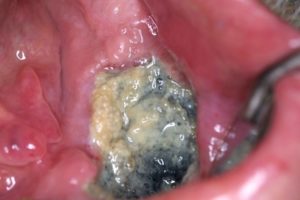Medication-related osteoradionecrosis of the jaw (MRONJ)
Your oncologist may have started you on a medication to stop the progression of cancer within your bones, or to prevent it. This group of medications include bisphosphonates which are generally administered in an intravenous (IV) form. Two common ones include Zometa (zoledronic acid) and Pamidronate (pamidronic acid). Visiting the dentist is extremely important as this medication generally means you should not have/try to avoid dental extractions in the future.
Bisphosphonates stop bone remodeling and turnover. This means that if teeth need to be extracted then there is a high risk that the sockets will not heal properly, leaving bone exposed and could lead to both acute and chronic infections, specifically medication-induced osteonecrosis of the jaw (MRONJ). Unfortunately, this risk is life-long and therefore teeth that may seem fine now, but are unlikely to last for many years, will need to be extracted.

Exposed and necrotic jaw bone many years after bisphosphonate treatment
Other medications that include monoclonal antibodies “Biologic therapies” or “Targeted medications” may also disrupt the healing of bone. The effects of these medications are not permanent but can remain in your system for many months, therefore timing of dental treatment that involves extractions needs to be coordinated with your oncologist to try to avoid this complication.
Some of these MRONJ-inducing medications include Xgeva® (Denosumab), Avastin® (bevacizumab), Glivec ®(Imatinib), Cabometyx® (Cabozantinib), Rapamune® (Sirolimus), Xofigo® (Radium-223)